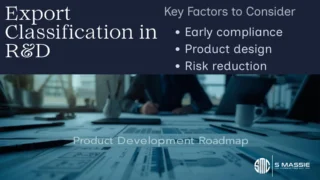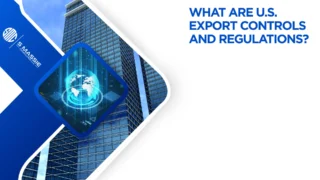The best way for U.S. exporters to stay on top if changing regulations is to have a written Export Compliance Program (ECP) in place to ensure adherence to U.S. export compliance rules and regulations. In this article, we will explore the importance of an ECP, its benefits for exporters, and the need for vigilance in light of rapidly changing sanctions and restrictions.
Changing Export Restrictions
In recent years, geopolitical conflicts and tensions have significantly influenced global trade dynamics. The ongoing war between Russia and Ukraine has intensified these challenges, leading to frequent changes in export restrictions. Exporters, especially those based in the United States, need to navigate this complex environment while ensuring compliance with ever-evolving regulations. This article aims to shed light on the importance of implementing an Export Compliance Program (ECP) and understanding the implications of changing export restrictions.
Understanding Export Compliance Programs
What is an Export Compliance Program?
An Export Compliance Program (ECP) is a comprehensive framework of policies, procedures, and controls designed to guide and manage a company’s export activities. It ensures that exporters operate in accordance with applicable laws and regulations, such as those imposed by the U.S. Government.
Components of an ECP
A well-designed ECP includes several essential components, such as:
- Written policies and procedures: These documents outline the company’s approach to export compliance, covering areas such as product classification, licensing, record-keeping, and screening processes.
- Training and awareness: Ensuring that employees understand their roles and responsibilities in export compliance is vital. Training programs educate personnel about export regulations, potential risks, and the importance of compliance.
- Internal controls and audits: Regular internal reviews and audits help assess the effectiveness of the ECP and identify any areas that require improvement. These measures promote ongoing compliance and provide opportunities for corrective action.
Benefits of an Export Compliance Program
Ensuring Regulatory Compliance
Implementing an ECP helps businesses maintain compliance with export regulations. By following established procedures and guidelines, exporters can minimize the risk of inadvertent violations and associated penalties.
Mitigating Risks
An ECP facilitates risk management by identifying potential vulnerabilities in export activities. Through risk assessments and internal controls, exporters can proactively address risks related to prohibited end-users, restricted destinations, and controlled technologies.
Enhanced Business Reputation
Companies with a robust ECP demonstrate a commitment to ethical and compliant business practices. This reputation can enhance business relationships, instill customer trust, and provide a competitive advantage in international markets.
The Changing Landscape of Export Restrictions
Ongoing Geopolitical Factors
The conflict between Russia and Ukraine has triggered a series of sanctions and export restrictions imposed by various governments and international bodies. These measures aim to address national security concerns and prevent the unauthorized transfer of sensitive technologies.
Evolving Sanctions Regimes
Export restrictions can include embargoes, licensing requirements, and prohibitions on specific goods or technologies. Governments regularly update these measures, adding or removing entities, countries, or technologies from restricted lists.
Implications for U.S. Exporters
U.S. exporters must stay informed about changes in export restrictions to avoid inadvertent violations. Failing to comply with evolving regulations can result in severe penalties, including fines, loss of export privileges, and reputational damage.
Monitoring Regulatory Updates
Given the dynamic nature of export restrictions, U.S. exporters must establish mechanisms to monitor and track regulatory changes. This can involve subscribing to relevant newsletters, regularly consulting government resources, and engaging with industry associations for timely updates.
Compliance and Documentation
Maintaining accurate and up-to-date documentation is crucial for demonstrating compliance with export regulations. Exporters should ensure proper record-keeping, product classification, and licensing to facilitate audits and investigations.
Risk Assessments and Due Diligence
Performing thorough risk assessments and due diligence processes when engaging with foreign customers, partners, and suppliers is essential. By assessing the risk associated with end-users and destinations, exporters can make informed decisions and mitigate potential compliance risks.
The Role of Export Compliance Consultants
Navigating the complexities of changing export restrictions requires expertise and knowledge of regulatory frameworks. Export compliance consultants offer specialized guidance and support in developing, implementing, and maintaining effective ECPs. These professionals can assist in interpreting export regulations, conducting compliance audits, and providing ongoing training to employees.
What is the role of an Export Compliance Program in mitigating risks?
An Export Compliance Program (ECP) helps businesses identify and manage risks associated with export activities. By establishing internal controls, conducting audits, and providing training, an ECP contributes to effective risk mitigation.
How can exporters stay updated on changing export restrictions?
Exporters can stay informed by subscribing to industry newsletters, regularly monitoring government resources, and engaging with trade associations for timely updates and guidance.
What are the potential penalties for non-compliance with export regulations?
Non-compliance with export regulations can result in severe penalties, including fines, loss of export privileges, reputational damage, or even jail time. It is essential for exporters to prioritize compliance to avoid these consequences.
How can export compliance consultants assist businesses in implementing an ECP?
Export compliance consultants provide specialized knowledge and guidance in developing, implementing, and maintaining effective Export Compliance Programs. They offer expertise in interpreting regulations, conducting audits, and providing ongoing training to ensure compliance.
Can an ECP enhance business reputation in international markets?
Yes, a well-implemented ECP demonstrates a commitment to ethical and compliant business practices. This reputation can enhance trust among international partners, customers, and stakeholders, leading to increased business opportunities.
Key Takeaway
In today’s rapidly changing global landscape, export restrictions play a significant role in international trade. The ongoing war between Russia and Ukraine has underscored the need for U.S. exporters to establish and maintain robust Export Compliance Programs (ECP).
Implementing an ECP enables exporters to navigate the complex regulatory environment, ensure compliance with evolving restrictions, mitigate risks, and maintain a competitive edge.
By staying informed, engaging with export compliance consultants, and prioritizing compliance, exporters can successfully adapt to changing export restrictions while safeguarding their operations and reputation.
Contact us to schedule a consultation or compliance review.






